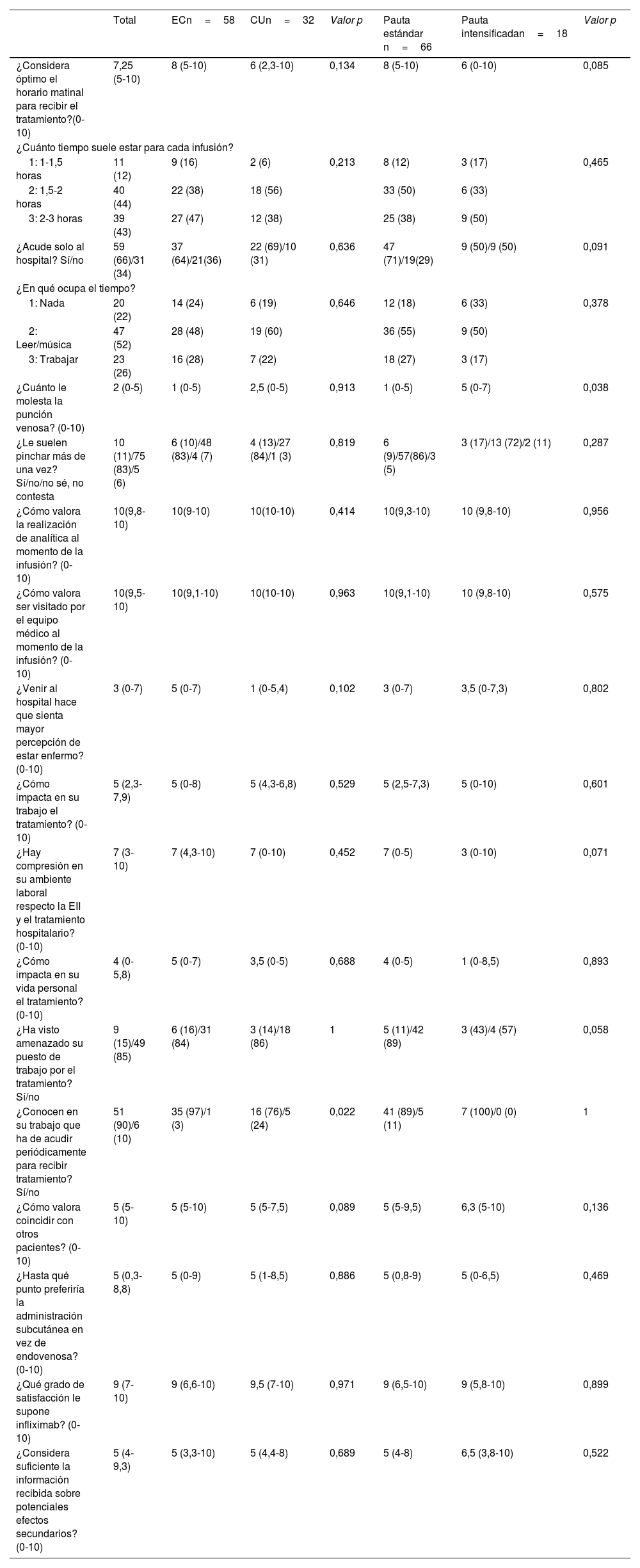Para el tratamiento de la enfermedad inflamatoria intestinal (EII) disponemos de tratamientos biológicos de administración endovenosa y subcutánea. Recientemente, algunos fármacos pueden administrarse por cualquiera de estas vías. Se desconoce el impacto real que la administración endovenosa produce sobre la percepción de la enfermedad y en la vida personal y laboral del paciente.
MétodosSe invitó a participar de forma anónima a todos los pacientes con EII en tratamiento con infliximab (IFX) endovenoso durante al menos seis meses a los que se facilitó un cuestionario específico estructurado con escalas visuales analógicas (0-10), en dos centros de referencia del área de Barcelona.
ResultadosSe incluyeron 90 pacientes con una mediana de edad de 45 años (36-56) y un tiempo mediano de tratamiento con IFX de 48 meses (24-84). La visita y terapia con IFX en hospital de día (HD) fue globalmente bien valorada (9, rango intercuartílico [IQR] 7-10).
De los pacientes, el 78% compaginaba la estancia en HD con otras actividades (26% laborales). El impacto a nivel personal resultó escaso (4, IQR 0-5.8) globalmente, pero el puesto de trabajo del paciente se vio amenazado en el 43% de los pacientes en pauta intensificada de tratamiento.
ConclusionesLa administración endovenosa de fármacos biológicos en régimen ambulatorio goza de un nivel de satisfacción elevado entre pacientes con EII. El impacto sobre la esfera laboral parece ser más pronunciado que en la personal, aspecto que debería tenerse en cuenta en la toma de decisiones compartidas con el paciente.
In the treatment of inflammatory bowel disease (IBD), we have biologic therapies administered intravenously and subcutaneously. Recently, some drugs can be administered by either of these routes. The real impact that intravenous administration has on the perception of the disease and the personal and work life of the patient is unknown.
MethodsAll IBD patients receiving intravenous infliximab treatment for at least 6 months were anonymously invited to participate. They were provided with a specific structured questionnaire with visual analogue scales (0-10) at two reference centers in the Barcelona area.
ResultsA total of 90 patients with a median age of 45 years (36-56) and a median infliximab treatment duration of 48 months (24-84) were included. The visit and therapy with infliximab in the day hospital were globally well evaluated (9, IQR 7-10). 78% of patients combined day hospital stays with other activities (26% employment). The personal impact was generally low (4, IQR 0-5.8), but the patient's job was threatened in 43% of patients on intensified treatment.
ConclusionsThe intravenous administration of biologic drugs on an outpatient basis is highly satisfactory among IBD patients. The impact on the work sphere appears to be more pronounced than on the personal sphere, an aspect that should be considered in shared decision-making with the patient.









